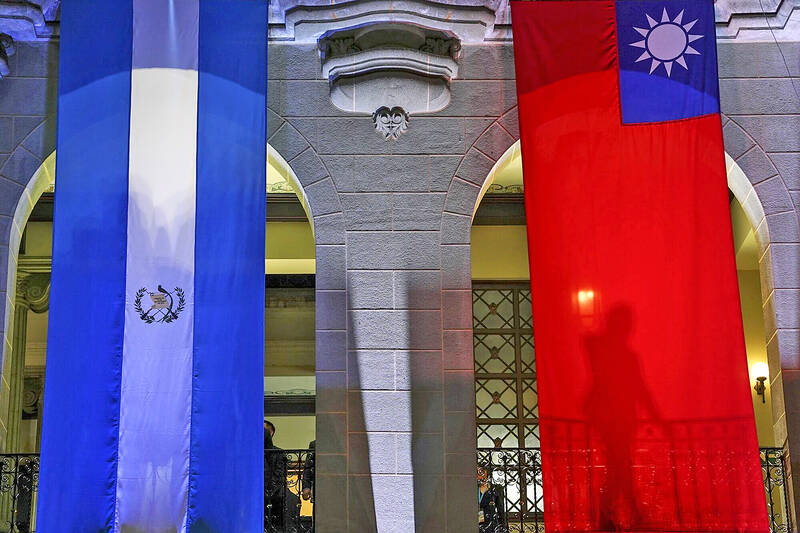Reports from an international affairs think tank and Spanish-language news media have brought to attention how China might leverage its economic power to undermine Taiwan’s relationship with Guatemala, one of the nation’s last remaining diplomatic allies in Central America.
Guatemalan President Bernardo Arevalo has publicly stated he supports his country’s ties to Taiwan, but with China’s capacity to offer financial incentives and its growing influence in the region, it could apply pressure to the country’s political establishment that could potentially lead to the establishment of diplomatic ties.
A recent report from Geopolitical Intelligence Services (GIS), a think tank founded by Prince Michael of Liechtenstein, points to Guatemala’s close ties with the US, which has repeatedly urged the Central American country to maintain formal diplomatic relations with Taiwan.

Photo: Bloomberg
Although Arevalo won 58 percent of the vote in the presidential election last year, the Guatemalan Congress is controlled by opposition parties, which has led to repeated political deadlock.
If Arevalo seeks additional funds to implement his political agenda over the complaints of the legislature, he could look to China as a source of backing, which would inevitably lead to a recalibration in the country’s formal diplomatic ties with Taiwan, the report said.
In recent years, China’s profile in Central America has grown substantially. It has poached several of Taiwan’s former diplomatic allies, such as El Salvador and Honduras, and made major investments in countries such as Costa Rica, also a former diplomatic ally which severed relations with Taiwan in 2007.
Diario Las Americas, a US-based Spanish-language newspaper, published a report on Sept. 9 which quoted two experts from Latin American think tank Center for the Opening and Development of Latin America detailing how countries in the region have grown closer to China in hopes of economic benefits, but have so far seen little results from increasing engagement.
The article raises concerns regarding China’s impact on the region’s socio-environmental systems, workers’ rights and wages, and the lack of transparency in how these countries engage with China.
In recent free-trade agreements (FTA) signed with Costa Rica, Chile and Peru, China has been the primary beneficiary of all three deals, the article states.
In Costa Rica in particular, China’s FTA was a major political victory as the country was the first “domino” to fall in the region and switch diplomatic recognition from Taiwan to China, the article says.
However, since the FTA was signed in 2010, Costa Rica’s trade deficit to China has grown, exports to China have lagged significantly behind exports to the US, and China has yet to make significant investments in the country, the piece adds.
The piece warns that short-term profits from closer ties to China run counter to national interests, and that while China advocates for “win-win” relations, the evidence has yet to materialize.

An essay competition jointly organized by a local writing society and a publisher affiliated with the Chinese Communist Party (CCP) might have contravened the Act Governing Relations Between the People of the Taiwan Area and the Mainland Area (臺灣地區與大陸地區人民關係條例), the Mainland Affairs Council (MAC) said on Thursday. “In this case, the partner organization is clearly an agency under the CCP’s Fujian Provincial Committee,” MAC Deputy Minister and spokesperson Liang Wen-chieh (梁文傑) said at a news briefing in Taipei. “It also involves bringing Taiwanese students to China with all-expenses-paid arrangements to attend award ceremonies and camps,” Liang said. Those two “characteristics” are typically sufficient

A magnitude 5.9 earthquake that struck about 33km off the coast of Hualien City was the "main shock" in a series of quakes in the area, with aftershocks expected over the next three days, the Central Weather Administration (CWA) said yesterday. Prior to the magnitude 5.9 quake shaking most of Taiwan at 6:53pm yesterday, six other earthquakes stronger than a magnitude of 4, starting with a magnitude 5.5 quake at 6:09pm, occurred in the area. CWA Seismological Center Director Wu Chien-fu (吳健富) confirmed that the quakes were all part of the same series and that the magnitude 5.5 temblor was

The brilliant blue waters, thick foliage and bucolic atmosphere on this seemingly idyllic archipelago deep in the Pacific Ocean belie the key role it now plays in a titanic geopolitical struggle. Palau is again on the front line as China, and the US and its allies prepare their forces in an intensifying contest for control over the Asia-Pacific region. The democratic nation of just 17,000 people hosts US-controlled airstrips and soon-to-be-completed radar installations that the US military describes as “critical” to monitoring vast swathes of water and airspace. It is also a key piece of the second island chain, a string of

The Central Weather Administration has issued a heat alert for southeastern Taiwan, warning of temperatures as high as 36°C today, while alerting some coastal areas of strong winds later in the day. Kaohsiung’s Neimen District (內門) and Pingtung County’s Neipu Township (內埔) are under an orange heat alert, which warns of temperatures as high as 36°C for three consecutive days, the CWA said, citing southwest winds. The heat would also extend to Tainan’s Nansi (楠西) and Yujing (玉井) districts, as well as Pingtung’s Gaoshu (高樹), Yanpu (鹽埔) and Majia (瑪家) townships, it said, forecasting highs of up to 36°C in those areas